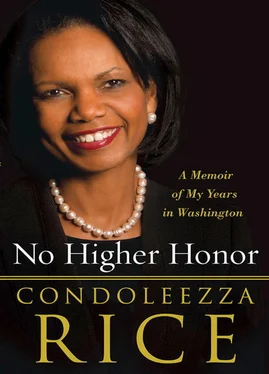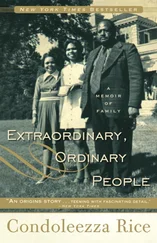Chris Hill and his North Korean counterpart, Kim Kye Gwan, worked on the declaration for months. I knew that everyone in the government was nervous about what was transpiring. Steve Hadley scheduled interagency meetings for Chris to apprise his colleagues about the course of diplomacy. Unfortunately, Chris often acted as if they were an intrusion into the considerable flexibility that I’d won for him with the President. By all accounts, he answered questions somewhat petulantly, only reinforcing concerns in the Pentagon, the Vice President’s office, and even the National Security Council staff.
There was a tendency, too, in the Washington press corps to attribute every breakthrough exclusively to Chris’s negotiating skill, which would only reinforce the misguided notion that State was somehow winning a bureaucratic battle against other agencies that opposed the course we were on. A few too many such stories appeared throughout the spring, and it was a problem for me and for Chris. We agreed after a while that he wouldn’t talk to the press about the negotiations. I’d take any questions so that I could deflect criticism of him from the right, on Capitol Hill, and within the administration. Chris also stepped back from the day-to-day negotiations with the North, handing that responsibility to an excellent Korean-speaking Foreign Service officer, Sung Kim, with Paul Haenle representing the NSC. This created something of a firewall since Paul could represent Steve and the White House directly and help keep the interagency process better informed. I can honestly say that Chris never operated outside his guidance, but the overhyping press coverage made it seem as if he was freelancing— successfully freelancing was the impression, but that didn’t earn him any slack. In any case, the personality dynamics made the already difficult issue even harder to manage.
• • •
THE NORTH KOREANS finally presented their formal declaration of their nuclear program on June 24, 2008. A few days later, they blew up a water-cooling tower at the nuclear facility in Yongbyon. Although the demolition was covered on CNN with great fanfare, this spectacle could not make up for serious deficiencies in North Korea’s declaration report. There was a fairly comprehensive accounting of their plutonium program, but the report revealed nothing about North Korea’s suspected uranium capability. And there was an accounting of the amount of plutonium the North had produced, but the declaration did not cover the issue of how many “devices” the North might have made with the plutonium it had harvested. Nonetheless, knowing how much material they had made allowed us to estimate how many devices there might be.
By prior arrangement, the delivery of the declaration was meant to trigger the removal of restrictions on North Korea from the Trading with the Enemy Act and also the lifting of the country’s designation as a state sponsor of terrorism. The latter was subject to a forty-five-day waiting period once the President notified Congress of his intention to do so.
The inadequacy of the North Korean declaration had been evident for some time, prompting a debate within the administration about whether to go ahead and remove the North from the United States’ state sponsor of terrorism list, which singled out countries that supply a terrorist organization with training, logistics, or material or financial support. Technically, the North Koreans should have already been removed from this list much earlier; there had not been, at the time, any known terrorist incident involving Pyongyang for two decades. But the signal that removing them from the list would send was important, all the more so since North Korea valued the step as legitimating its regime in the eyes of the international community.
The Japanese were lobbying hard against lifting the designation, though. They worried, as before, that there would not be enough pressure on the North to resolve the abduction issue. We’d tried to help, and indeed, Pyongyang had agreed to some small steps, including a plan to reopen investigations into the abductions issue and answer questions about the fate of the victims.
The Vice President was dead set against removing the North Koreans from the terrorism list, saying that it would reward bad behavior since the North hadn’t lived up to its obligations in filing the declaration. At one of the several NSC meetings held on the subject, one participant said, “We have to get the North Koreans to tell the truth.” I sometimes wondered if that was a quixotic fantasy. The North Koreans say that their country is paradise and South Korea is a prison camp , I thought to myself. They aren’t acquainted with the truth . But the point was well taken; we had to find some way to get a handle on the uranium enrichment issue.
We decided to go at the problem from another angle. The North Koreans would also have to agree to a verification protocol to govern the on-site inspection of all aspects of their nuclear program. That protocol, if properly structured, would give us access to sites both declared and undeclared, meaning that we’d have the right to inspect a building or facility even if the North hadn’t put it on the declaration. We could then trigger inspections of sites that were suspected of being associated with uranium enrichment.
We were also seeking an acknowledgment of North Korea’s alleged proliferation of nuclear technology and know-how to other entities. This issue was meant to deal with a very troubling problem: strong suspicions and evidence of North Korean assistance to Syria in the building of an undeclared nuclear reactor that had been discovered the year before.
The covert facility had been destroyed in an Israeli air strike, after President Bush had refused an Israeli request that we carry out the operation ourselves. We met as a national security team on this issue for the better part of two months. The Vice President favored U.S. action, while Bob Gates and I stood against it. When Mike Hayden, the CIA director, told us that he couldn’t certify with anything other than low confidence that the reactor was part of a nuclear weapons program, the President decided against a strike and suggested a diplomatic course to the Israeli prime minister. Ehud Olmert thanked us for our input but rejected our advice, and the Israelis then expertly did the job themselves.
As can be imagined, though, this complicated even more the question of what to do about North Korea. In April 2008 the Central Intelligence Agency released images of the Syrian reactor, elements of which were strikingly similar to some of the construction and engineering components at North Korea’s Yongbyon nuclear facilities. “How can we deal with a country that lies on its declaration, is still pursuing nuclear weapons and is suspected of helping Syria build a reactor for its own program?” That was a very good and penetrating question asked by the opponents of continued diplomacy with the North. But I felt strongly that we had to go the last mile to see if we could stop Pyongyang’s further development of nuclear weapons. And I thought that if we could just get people on the ground—good, well-trained U.S. inspectors—we might really learn what was going on inside this isolated, dangerous country.
The forty-five-day waiting period on the “state sponsor of terrorism” designation came and went as we worked feverishly to get the North to improve the tenets of a proposed verification protocol before we would consider removing Pyongyang from the list. There is little doubt in my mind that the Chinese were helping put pressure on the regime this time. Of all nations, China has the most influence on North Korea. But the Chinese cannot dictate to the North, and sometimes it was wearisome to watch Beijing’s own frustration with Kim Jong-il.
Читать дальше












